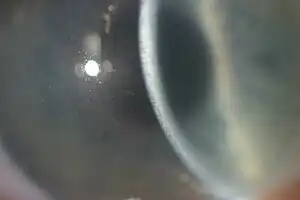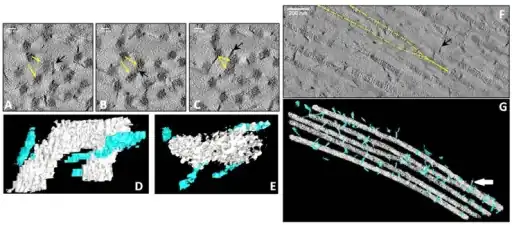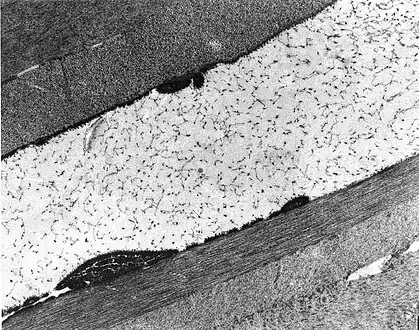Congenital stromal corneal dystrophy
| Congenital stromal corneal dystrophy | |
|---|---|
| Other names: Witschel dystrophy | |
 | |
| The cornea is particularly opaque in the anterior stroma by slit-lamp biomicroscopy. | |
Congenital stromal corneal dystrophy (CSCD) is an extremely rare, autosomal dominant form of corneal dystrophy.[1] Only 4 families have been reported to have the disease by 2009.[2] The main features of the disease are numerous opaque flaky or feathery areas of clouding in the stroma that multiply with age and eventually preclude visibility of the endothelium. Strabismus or primary open angle glaucoma was noted in some of the patients. Thickness of the cornea stays the same, Descemet's membrane and endothelium are relatively unaffected, but the fibrils of collagen that constitute stromal lamellae are reduced in diameter and lamellae themselves are packed significantly more tightly.
Signs and symptoms
The clinical presentation of this condition demonstrates development of bilateral corneal lesions before birth, with some individuals eventually having strabismus or primary open-angle glaucoma[3]
Genetics
 a-g)3-D reconstruction showing collagen fusing in areas of abnormal lamellae in CSCD.
a-g)3-D reconstruction showing collagen fusing in areas of abnormal lamellae in CSCD. Congenital stromal dystrophy. Transmission electron microscopy of the corneal stroma showing normal collagen lamellae separated by abnormal randomly distributed collagen filaments in an electron-lucent extracellular matrix.
Congenital stromal dystrophy. Transmission electron microscopy of the corneal stroma showing normal collagen lamellae separated by abnormal randomly distributed collagen filaments in an electron-lucent extracellular matrix.
CSCD is associated with a mutation in the gene DCN that encodes the protein decorin, located at chromosome 12q22.[1] The disorder is inherited in an autosomal dominant manner,[1] which indicates that the defective gene responsible for a disorder is located on an autosome (chromosome 12 is an autosome), and only one copy of the gene is sufficient to cause the disorder, when inherited from a parent who has the disorder.
Diagnosis
For the diagnosis of this condition, a slit lamp, among other ocular procedures, is used[4]
Treatment
In terms of treatment for this condition we find that full-thickness cornea transplant is done[3]
References
- 1 2 3 Bredrup, C.; Knappskog, P. M.; Majewski, J.; Rødahl, E.; Boman, H. (February 2005). "Congenital stromal dystrophy of the cornea caused by a mutation in the decorin gene" (Free full text). Invest Ophthalmol Vis Sci. 46 (2): 420–426. doi:10.1167/iovs.04-0804. PMID 15671264. Archived from the original on 2009-08-07. Retrieved 2022-04-25.
- ↑ Klintworth GK (2009). "Corneal dystrophies". Orphanet J Rare Dis. 4: 7. doi:10.1186/1750-1172-4-7. PMC 2695576. PMID 19236704.
- 1 2 RESERVED, INSERM US14-- ALL RIGHTS. "Orphanet: Congenital stromal corneal dystrophy". www.orpha.net. Archived from the original on 17 April 2021. Retrieved 9 July 2022.
- ↑ Rødahl, Eyvind; Knappskog, Per M.; Bredrup, Cecilie; Boman, Helge (1993). "Congenital Stromal Corneal Dystrophy". GeneReviews®. University of Washington, Seattle. Archived from the original on 21 January 2022. Retrieved 9 July 2022.
External links
- GeneReviews/NCBI/NIH/UW entry on Congenital Stromal Corneal Dystrophy Archived 2022-01-21 at the Wayback Machine
| Classification | |
|---|---|
| External resources |
|
Template:Human corneal dystrophy